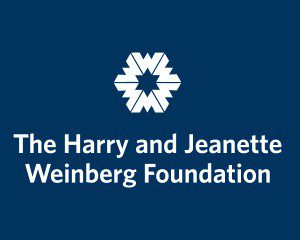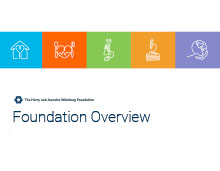As the new year opens, the Foundation extends its deepest thanks and appreciation to its many grantees and partners. In the midst of an ongoing and extraordinarily challenging time due to the COVID-19 pandemic, you have endured, continuing remarkable work despite these ever-evolving challenges.
It’s during this challenging time that the Foundation also reflects on its strategic efforts, collaborations, and major funding commitments. Throughout 2021, the Foundation continued to expand its focus on strategic grantmaking across multiple portfolios—Housing, Health, Jobs, Education, and Community Services. Of the Foundation’s $130 million in 2021 grant funding, nearly half was invested in proactive, strategic efforts such as the Community Development Financial Institutions (CDFIs) initiative or Housing Upgrades to Benefit Seniors (HUBS) (more details below). Additionally, the Foundation continued its strong response to COVID-19. To date, the Foundation has committed $25 million in COVID emergency funding, including more than $6 million in renewal grants to existing grantees in 2021.
The Foundation will continue to increase focus on strategic and proactive grantmaking, as well as develop new ways to leverage other resources. These priorities will guide and inform the Foundation’s grantmaking and partnerships throughout 2022 and beyond. In fact, the Foundation expects to provide approximately $140 million in total grant activity supporting nonprofits that provide direct services in the areas of Housing, Health, Jobs, Education, and Community Services this year. The projects that follow are just a few examples of the exceptional efforts grantees have been supporting within the Foundation’s priority communities and nationally.
Housing
The Foundation engaged with two nationally recognized partners to focus on maximizing its impact in the areas of affordable housing development and reducing homelessness within its US priority communities.
- Forsyth Street Advisors conducted assessments of affordable housing systems in the Foundation’s six US priority communities and is assisting in the use of housing finance strategies that achieve greater leverage in order to develop more units of permanent supportive housing. With its guidance, the Foundation recently provided a grant of $1 million to Fortune Society to convert a shuttered New York City hotel into 68 units of supportive housing for people experiencing homelessness who were formerly incarcerated.
- The Foundation also partnered with the Corporation for Supportive Housing to review the homelessness systems in its US priority communities and develop recommendations for how it might achieve greater impact on reducing homelessness in those communities.
Health
The Foundation identified opportunities for leverage that build long-term sustainable models for addressing health care access and older adult services.
- Last year, the Foundation approved 12 grants totaling $5,875,000 to provide capital support to the CAPABLE (Community Aging in Place-Advancing Better Living for Elders) and HUBS (Housing Upgrades to Benefit Seniors) program models, which support older adults as they age in place and require critical home repairs to remain safe and maintain generational wealth in low-income communities. The CAPABLE model continues to be poised to gain approval through the Center for Medicaid and Medicare Studies pipeline having achieved a successful review by an independent federal advisory committee that makes recommendations to the Secretary of Health and Human Services on stakeholder-submitted payment models. The HUBS expansion continues to leverage approximately $18 million in funds from Baltimore City, and other sources, for a total project budget of more than $22 million—to maintain a cleared city rehab list of low-income older adults in Baltimore waiting for home modifications and repairs.
Jobs
The Foundation developed a signature Jewish initiative in partnership with the Network of Jewish Human Services Agencies (NJHSA).
- NJHSA received a $1.75 million Foundation grant, which includes the launch of the first national employment program, Project EM: Empowering and Employing Our Community. This national virtual employment program is delivered across 19 Jewish vocational services agencies with a goal of supporting more than 1,500 job seekers annually. Project EM provides an extensive continuum of career services, including training, placement, and job retention, regardless of the client’s location. This initiative includes a partnership with Boston College to assess the effectiveness of Workforce Interventions Network’s (WIN) curriculum, making this initiative the most extensive opportunity to evaluate employment services within the Jewish human services sector.
Education
The Foundation prioritized the importance of evaluation to ensure grants are making an impact in the communities they are serving.
- A comprehensive evaluation of The Baltimore Elementary and Middle School Library Project—a multi-year, collaborative effort that builds or transforms Baltimore City Public School libraries in neighborhoods where many students face academic and economic challenges—began in June 2021 in partnership with Sharp Insight, LLC. This evaluation will look at the impact of the school libraries on students, families, and staff; analyze what makes this unique public-philanthropic partnership work; and develop a toolkit for how to replicate this type of partnership in other school systems. The Foundation looks forward to reviewing the results of this evaluation in late 2022.
The Library Project completed two new libraries last year including the Maryland School for the Blind and Fallstaff Elementary Middle. The new library at Maryland School for the Blind sets the gold standard of school library accessibility for visually impaired students in Maryland. By 2024, the Library Project will serve nearly 9,000 students, as well as their families, through 19 new libraries (17 completed to date) and will have leveraged more than $30 million in additional federal, state, and local funds. The Foundation has committed $15 million to this initiative.
Community Services
- The Foundation launched a $7.5 million initiative to support Community Development Financial Institutions (CDFIs) to address nonprofit resiliency in response to the pandemic and to the systematic barriers nonprofits led by Black, Indigenous and people of color (BIPOC) face accessing capital. CDFI partners—Hawaiʻi Community Reinvestment Corporation (HCRC), IFF, and Nonprofit Finance Fund (NFF)—are already developing new outreach strategies and modified lending services to address equity for smaller, grassroots, and BIPOC-led nonprofits both in response to the impacts of the pandemic and the inequities it helped to expose.
- The Foundation introduced a new strategic plan for US Jewish grants, informed by more than 25 leaders in US Jewish philanthropy. Highlights include continuing a strong focus on Jewish poverty and support for Jews of Color, while preserving the Foundation’s commitment to strengthening the Jewish nonprofit sector overall, as well as combatting antisemitism.




